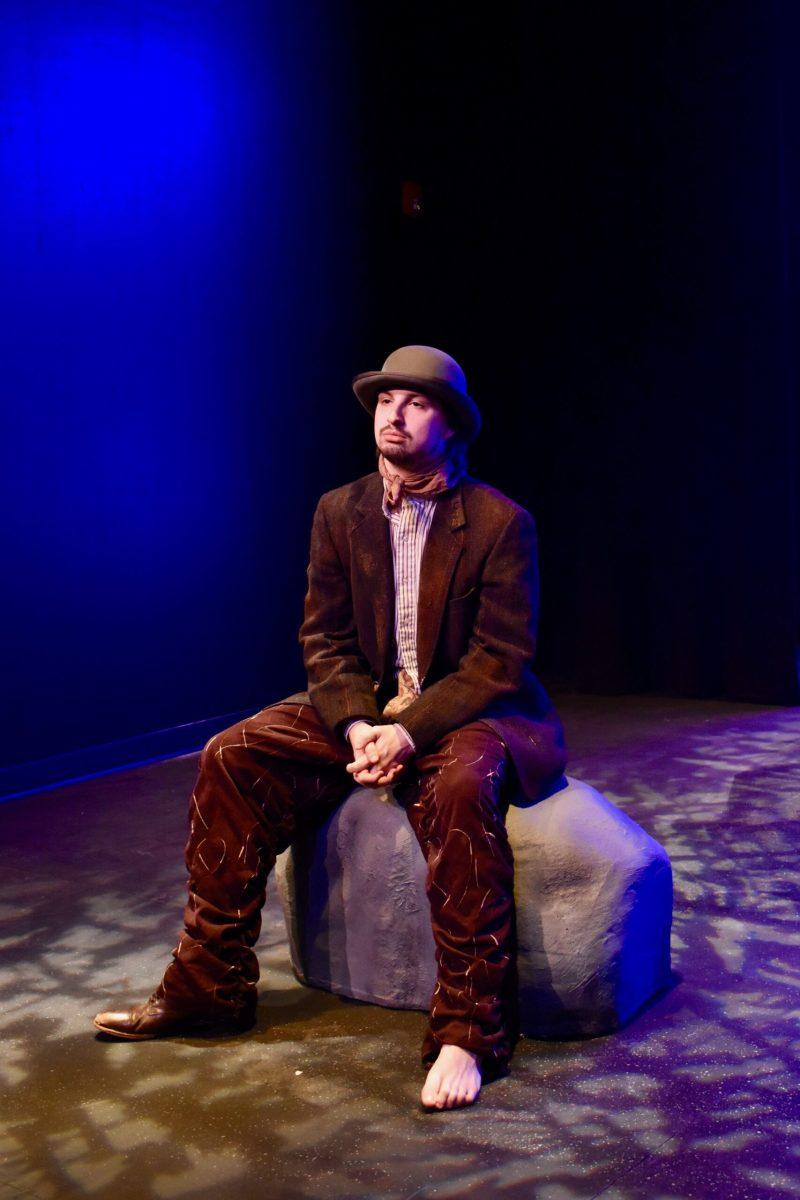
After two months of rehearsals, the MU Theatre Department put on the play “Waiting for Godot.” Suzanne Burgoyne, the Curators’ Distinguished Teaching Professor of Theatre at MU, chose this play with every intention of facing the challenges that the play exhibits.
The play was first produced in Paris in 1953 by Samuel Beckett. After the play was written, it was included in Martin Esslin’s book ‘Theatre of the Absurd’. Esslin picked a number of playwrights in that period that wrote about dealing with existentialism and the lack of meaning in life during the 20th century.
Auditions for “Waiting for Godot” started toward the end of fall and were open to all students. After the cast list was posted, rehearsals started the week after winter break and led up until the performances, March 13 to 17. Each of the five actors had to put time and effort towards molding into each character.
Theatre performance senior Samuel DeMuria played Vladimir, one of the protagonists in the show. Vladimir and Estragon, his good friend, wait for Godot near a tree and stone. Even though DeMuria is experienced in theatre, “Waiting for Godot” has been the hardest part he has taken on thus far, he said.
“I sort of never leave stage; it’s me and Estragon for two hours,” DeMuria said. “It’s just us making the time pass. Trying to find meaning in life. It takes an immense amount of energy to keep an audience engaged… For me, getting into the philosophical side of Vladimir was hard, but eventually, I got there. It took some time trying to relate certain things to parts of my life.”
Burgoyne picked this play with a lot of consideration and knew that it was the right choice for the potential actors, audience involvement, familiarity and financial conservation.
“I did think we had actors who could do the play here,” Burgoyne said. “We were looking for a play that did not require a lot of sets or costumes. The set for this play is a tree and a stone. It was a play that could be done without a lot of expensive costumes and scenery.”
DeMuria has been able to ask indurate questions to himself about life in general from taking on the role of Vladimir. The impact of “Waiting for Godot” has changed certain perspectives for him about why people do certain things in life.
“We play games to make the time pass, and we have conversations, we talk about things and we argue,” DeMuria said. “In the moments of the play when these things end, we kind of get lost in the void for a bit, and then we have to snap back into doing something else. The void is like the nothingness that is after you die. It’s really just about ‘what is the meaning of life?’ Do we find meaning in life through the games we play with one another or the people that we meet or the things that we do.”
Jack Fulkerson, a freshman theatre performance major at MU, played Boy in “Waiting for Godot.” Fulkerson had never participated in theatre until college and has not regretted one second of it, due to the heartening theatre department on campus.
“I’ve met some amazing people in the theatre department,” Fulkerson said. “Some really good friends I’ve made through the shows and classes. The professors are very hands-on with you. I’ve definitely been embraced into a really loving community. I’ve felt at home.”
Fulkerson has the smallest role in the play but invokes the presence of Godot when he is on stage and gives the most context on what is going on in a scene.
“People don’t really know who he is, he kinda just shows up and then leaves,” Fulkerson said. “When I talked to my director, we think he’s an angel. Godot is God, that’s what Godot represents, and the boy is the angel… He knows everything, he knows that Godot is not really going to come and that they’re fools for waiting.”
Burgoyne first saw “Waiting for Godot” during the first year of her marriage, and recalled how it made her realize that the symbolism in the play reflects marriage. Therefore, the play is deeply meaningful to her, but also painful at the same time.
“This play really raises a lot of questions about the meaning of human existence,” Burgoyne said. “It raises awareness, makes you think. It also makes you laugh about all the problems we humans have, and the ones we cause for ourselves and each other. So I hope it will make people think about how human beings treat each other.”
Burgoyne has left lasting impressions on the actors she has worked with because of the way that she directs. If an actor wants to work with Burgoyne, they must have an answer for “why” they act a certain way.
“Suzanne is very very meticulous, and I really appreciate that,” Fulkerson said. “She will ask you what you’re thinking in the scene, why you’re saying what you’re saying, why you’re moving while you’re moving. Everything you’re doing in the scene she’ll ask you why, and I think that really helps flesh out the core ideas of the play, and it reads better to the audience. It feels like what you’re doing is more real.”
Overall, Waiting for Godot has helped shape Fulkerson and DeMuria’s acting style, and will be a play that will make them think for years to come.
“It pushes you to find levels of energy or emotion that you wouldn’t find if you didn’t act or perform,” Fulkerson said. “I’ve really learned how to connect with people more as well, by doing theatre because we really focus on small intimate moments, how you’re thinking in the scene. It’s definitely transformed my real life as well.”
_Edited by Janae McKenzie | [email protected]_